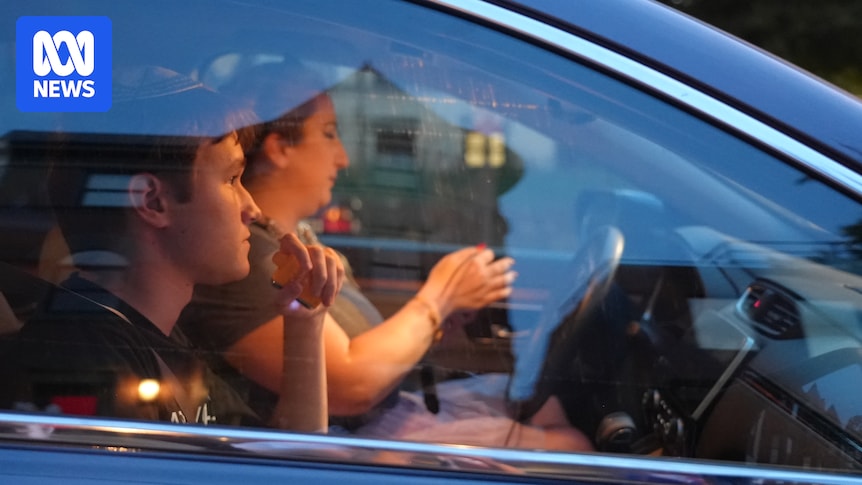
On a typical weeknight in Washington, DC, the sight of soldiers with assault rifles patrolling national parks and federal agents stationed along bustling nightlife streets has become a common occurrence. This increased federal presence is part of a crime crackdown ordered by President Donald Trump. Yet, these law enforcement officers find themselves under scrutiny as local activists vigilantly monitor their actions.
Using encrypted messaging apps and patrolling the streets, these activists aim to document and share federal agents’ activities online. Among them are individuals using aliases like Elli, Cap, Gizmo, and Brit, who openly express their disapproval of the federal agents’ presence. Elli, a 19-year-old activist, has been filming federal agents nightly since the crackdown was announced, balancing this with a job at a local bar.
“I intend to keep doing this until these feds leave or I end up in handcuffs — whichever one comes first,” Elli told ABC News. “Am I afraid? Yes. But that doesn’t mean that I’m intimidated into stopping, into being silent.”
Community Concerns Over Federal Crackdown
Three weeks ago, President Trump declared an “epidemic of crime” in Washington, announcing a federal takeover of the city’s police department. This move brought hundreds of officers and agents from various federal agencies and National Guard troops into the city. Trump described it as a historic effort to “rescue our nation’s capital from crime, bloodshed, bedlam and squalor and worse.”
Initially, DC’s Democratic Mayor Muriel Bowser opposed Trump’s claims, stating that the city was “not experiencing a crime spike” and called the federal intervention “unsettling and unprecedented.” However, she later acknowledged a significant reduction in crime, including an “87 percent reduction in carjackings.”
“We greatly appreciate the surge of officers that enhance what MPD (Metropolitan Police Department) has been able to do in this city,” Mayor Bowser said.
While some residents welcome the reduction in violent crime, others, like Reverend George Gilbert Jr, feel their communities are being unfairly targeted. Gilbert describes Washington as “a city under siege,” expressing concerns about the tactics used by federal agents, particularly in lower socio-economic neighborhoods.
The Role of Activist Networks
Amidst this backdrop, a network of “street watchers” has emerged, dedicated to documenting federal police activity. Elli and their team, for example, were present at a petrol station where a fight broke out, resulting in a large police presence. The activists aim to ensure that arrests are conducted properly and that individuals’ rights are respected.
“Initially, our concern is brutality; we wanted to make sure that they were treating him with respect,” Elli explained. “We’re here to just make sure that everything is being done according to procedure, and so far, it seems like it has, and that could be because we are here.”
Elli and their group also engage in “backroom documenting,” capturing images of license plates, agents’ faces, badges, and behaviors to build a system for tracking federal presence in the city.
ICE Actions and Community Reactions
In addition to general law enforcement, Immigration and Customs Enforcement (ICE) agents have been active in the city, targeting communal spaces and detaining individuals. The Department of Homeland Security claims they are focusing on “the worst of the worst,” yet reports indicate that many detained have only committed immigration violations from decades ago.
Religious leaders across DC have voiced their concerns, urging ICE to refrain from using church properties as staging areas. Reverend Gilbert criticized the federal actions, stating they contradict Christian values of compassion and care for the vulnerable.
“What we are saying to the White House is that the acts that they are doing throughout Washington, DC, are not acts of love and have nothing to do with Christianity,” Reverend Gilbert stated.
Political and Social Implications
While Mayor Bowser appreciates the crime reduction, she remains critical of other aspects of the federal intervention, particularly the presence of masked ICE agents. Within the DC council, figures like Council Member Zachary Parker advocate for continued protests against the federal presence, emphasizing the need to protect local autonomy and democracy.
Parker has organized town halls to strategize effective protest methods, encouraging residents to push back against what he describes as a “dangerous” federal overreach.
“This is about power and control and the dangerous tactics that this administration is employing to disrupt our local autonomy, and I would argue disrupt democracy, here in the country,” Parker asserted.
As the federal crackdown continues, Washington, DC, remains a city divided, with ongoing debates about the balance between security and civil liberties. The actions of both federal agents and local activists will likely shape the capital’s social and political landscape in the weeks to come.







